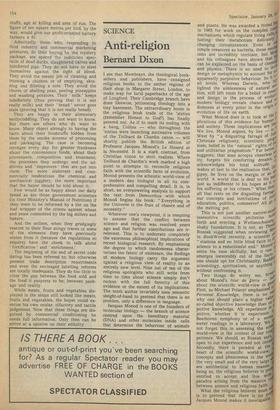SCIENCE
Anti-religion
Bernard Dixon
I see that Mowbrays, the theological booksellers and publishers, have • consigned religious books to the nether regions of their shop in Margaret Street, London, to make way for lurid paperbacks of the age of Longford. Their Cambridge branch have done likewise, jettisoning theology into a tiny basement. The extraordinary boom in the religious book trade of the 'sixties (remember Honest to God?) has finally petered out. As if to mark its ending with a bang, Collins — who throughout the 'sixties were launching successive volumes of the Teilhard de Chardin canon — will shortly publish the British edition of Professor Jacques Monod's Le Hasard et la Necessite. It is a stark contrast, from Christian vision to stoic realism. Where Teilhard de Chardin's work marked a high point in attempts to reconcile religious faith with the scientific facts of evolution, Monod presents the atheistic world-view of a modern day biologist in all its comprehensive and compelling detail. It is, in short, an overpowering analysis to support the text from Democritus with which Monod begins his book: "Everything in the Universe is the fruit of chance and of necessity."
Whatever one's viewpoint, it is tempting to assume that the conflict between science and religion was resolved years ago and that further contributions are irrelevant. This is to underrate completely the enormous philosophical implications of recent biological research. By emphasising the degree to which randomness characterises the fabric of existence, the findings of modern biology carry the argument against a religious view of reality to an entirely new level. Nine out of ten of the religious apologists who still write from time to time about science simply don't reckon with the full ferocity of this evidence or the extent of its implications. The tenth author invariably uses semantic sleight-of-hand to pretend that there is no problem, only a difference in language.
Jacques Monod is one of the founders of molecular biology — the branch of science centred upon the hereditary material (DNA) and other molecules inside cells that determine the behaviour of animals and plants. He was awarded a Nobel in 1965 for work on the complex CO mechanisms which regulate living cellS, justing their metabolism delicatelY changing circumstances. Even in sh simple creatures as bacteria, these Mee' isms are incredibly intricate, but NI° and his colleagues have shown that can be explained on the basis of chetniso and physics. There is no need to inv„d design or metaphysics to account for s!t apparently purposive behaviour. So it 1.5A all levels. Whereas Darwin, who 11 lighted the aimlessness of natural seo tion, still left room for a belief in crest.d and design in the process of evolc modern biology reveals chance and domness at every point in the origin evolution of life on earth. What Monod does is to look at the plications of this evidence for human,e0 and society. Those implications are bi We live, Monod argues, by lies — West by "a disgusting farrago of Juif Christian religiosity, scientistic Pr°g„,f sism, belief in the natural ' rights of and utilitarian pragmatism." Far betel:0 suggests, that man accepts cheerless ity, forgets his comforting dreatos, acknowledges his total solitude. wakes at last to the realisation that, gipsy, he lives on the margin of an a,,O world. A world that is deaf to his just as indifferent to his hopes as it I his suffering or his crimes." What then', all that rests on the disgusting farragtio our concepts and institutions of lesio education, politics, commerce? All g° the Melting pot. This is not just another narrow-ono insensitive scientific philistine h,°' forth and erecting a Weitanschata, shaky foundations. It is not, as Roszak suggested when reviewing in BookWorid recently, a scientist °do "stamina and no little blind faith W, science to a reductionist end." Mono rty sents his case skilfully, but it one ?, emerges inexorably out of the faetlio one should opt for Christianity, Budel'e; scientology, spiritualism, or anything without confronting it. yid Two things do worry me, 11°4 about Monod's tour de force -'13,41 about the scientific world-view in ge; First, as Michael Polanyi emphasised to Personal Knowledge, there is no fee, why one should place a higher val°5, so-called objective knowledge than 0° jective knowledge. All experience isd jective, whether it is experience Beethoven symphony or of a SeriP meter readings in a laboratory. We not forget this in assessing the a°I world-view in the context of our to perience. We should, as Roszak saYSt open to our experience and not cena Secondly, there is paradox at the heart of the scientific world-vieW, concepts and phenomena in the W° the very small and of the very large are antithetical to human reason. being so, the religious believer is pe,„ entitled to accept and live v.itt"„ paradox arising from the massive e" between science and religious faith. What the religious believer must 1ln is to pretend that there is no Pr" Jacques Monad makes it inescapable.










































 Previous page
Previous page